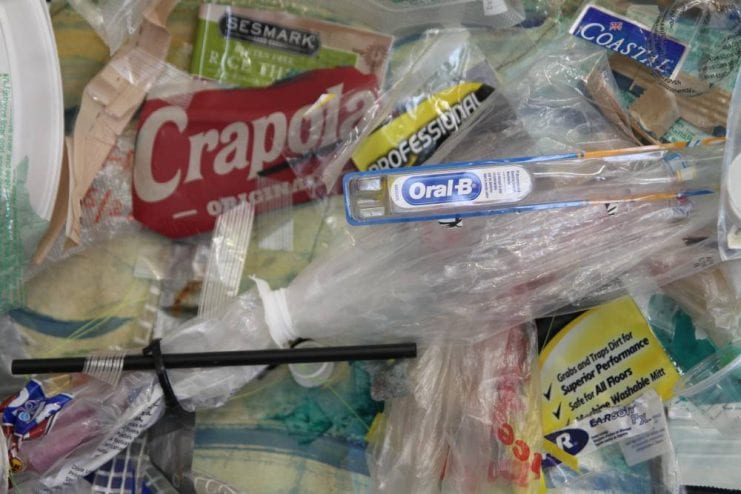
Voters in Sitka will see a plastic bag ban on the municipal ballot this fall. If passed, the measure would ban single-use plastic bags at local retailers and require businesses charge a fee for paper bags.
“I take it as a woman holding the world up but drowning in plastic or trying to keep her head above water as she tries not to drown in plastic,” says Pat Kehoe, standing in the lobby at AC Lakeside. She points to a painting by Libby Stortz, as she installs several pieces for the “Ugly Side of Plastic” art show. It’s been traveling from store to store for the past couple of months, raising awareness about the amount of single use plastic humans introduce into the environment each year.
Works of poetry and photography hang on the walls alongside several collages and paintings. Kehoe points to a sculpture by Pamela Ash of a bird skeleton. Two brown dirt clods with blue and white plastic bits woven throughout sit next to it.
“They’re actual bird pellets with plastic in them,” Kehoe says. “It’s really horrid.”
Kehoe is part of a citizen action group called “Bags for Change.” Former Sitka Assembly member Michelle Putz leads the group. Her husband, Perry, also serves on the KCAW board.
“Since 2016, there’s been a group of us working towards using less plastic in general and encouraging some sort of change,” says Putz. “Moving people towards using reusable bags. Essentially putting a whole lot of carrots out there and also having a stick, potentially.”
Putz’s “stick” has gone through a couple of iterations. Organizers last year brought a plastic bag fee to the Sitka Assembly but it fizzled on second reading when some Sitkans pushed back. So Putz and friends went back to the drawing board and drafted a ballot proposition. Now a plastic bag ban will go before voters this October.
“We’ve never wanted to be political,” Putz says. “We’ve always wanted to be educational and just share the problems that are associated with plastics getting into the ocean, getting into the air, getting into our bodies.”
There are three components to the ballot proposition: First an all-out ban on single-use plastic bags. Second, a requirement that retailers charge a fee for paper bag use. And third, a fine to retailers who fail to follow the policy.
Single-use plastic bags rose in popularity in the 1980s. But in just a few decades, we’ve used a lot of them. In 2018, National Geographic Magazine reported that American shoppers use one bag a day on average. Putz says her group worked with local grocers, showing them the drafts of their petition before they began collecting signatures.
“They estimate that between the two of them we give away over two million plastic bags a year in Sitka,” she says. “And that’s just at the two grocery stores. So add in all the other stores, I have to guess it’s around 3 million.”
Greg Dahl, the branch manager at AC Lakeside, says that number is right.
“We go through 500 cases a year,” he says. Dahl confirms Putz’s numbers are spot on. And the bags cost the grocery store just over $29,000 a year.
Even though he recognizes the intention is good — cutting down on waste in Sitka — Dahl says that it’s hard for Lakeside to take an official position, since they stand to benefit financially if the ban passes.
“I don’t think it’s fair for us to have an official stance to sway any voters either way,” he says. “It’s completely up to them.”
And some Sitkans may not be swayed. Although no one has stood in the roundabout with a pro-plastic sign, threads and polls on social media have generated considerable debate. Putz says she doesn’t fully understand the opposition.
“It’s hard for me to say why there are such strong feelings about plastic, plastic bags and other things in general,” she says. “A lot of it is that, people think that there’s larger problems out there to fix.”
Putz says the group recognizes all the plastic out there: the plastic water bottles, the plastic packaging. “We want to get rid of that too,” she says. “But we’re just starting with one at a time.”
But overall, it seems people’s attitudes are changing. Bags for Change polled 250 grocery shoppers last year and found the majority would support a ban or fee. A similar poll on the Facebook group Sitka Chatters saw around half in favor and half opposed. Putz says some local business owners report more customers refusing single use bags, bringing their own reusable alternatives or carry things out in their arms.
Putz says that’s the trick — changing one little behavior at a time.
“It is one tiny behavior that can change a lot in our community,” she says. “If I didn’t see plastic bags lining the ditches in the spring, boy would I love that.”
Back at AC Lakeside, Kehoe shows me the piece she painted.
“This is a plastic world, but there’s a little mushroom that the mycelium actually break down plastic,” she says. “So my thought is that even though we’re littered with plastic, there is hope.”
And the group is hopeful, too, that Sitkans won’t depend on mushrooms to clean things up. Rather, they hope Sitkans will clean up at the polls this fall.































